Agriculture, a cornerstone of human civilization, is currently experiencing its fourth major transformation, driven by Artificial Intelligence (AI) and the Internet of Things (IoT). These advancements are drastically reshaping farming practices to address the challenges faced by the agricultural sector and meet the food demands of a growing global population.
Today’s innovations in AI and IoT are not isolated developments; they follow millennia of agricultural evolution. From the Fertile Crescent to the Green Revolution, each significant advancement has helped farmers produce more food efficiently. Yet, contemporary issues like climate change, drought, and the need for sustainable practices underscore the necessity for another transformation. AI and IoT offer promising solutions, integrating precision, efficiency, and sustainability into modern farming.
Technological Innovations in Precision Agriculture
Data Collection and Analysis
The rise of smart farming is largely attributed to the enhanced ability to collect and analyze vast datasets. AI and IoT technologies enable targeted data gathering through UAVs (Unmanned Aerial Vehicles), UGVs (Unmanned Ground Vehicles), and wireless sensors. These devices monitor a broad spectrum of variables, including soil moisture, temperature, humidity, pest prevalence, and rainfall. Machine learning and deep learning algorithms then process this data to provide actionable insights, significantly improving decision-making processes.
In addition, high-resolution spectral imaging from satellites can identify potential drought stress weeks before it becomes visible to the naked eye. This early warning system allows farmers to take preventative actions, reducing crop loss. The integration of historical data, from ancient agricultural records to modern USDA statistics, further refines predictive models, enhancing the reliability of these forecasts.
Water Resource Management
Effective water management is critical for sustainable farming, particularly in regions prone to drought. AI systems like IBM’s Liquid Prep utilize soil moisture sensors and weather forecasts to optimize irrigation schedules. This ensures efficient water use, reducing waste and increasing crop yields. These systems can learn and adapt over time, continuously improving their recommendations based on new data inputs.
The ability to detect early signs of drought stress through advanced spectral imaging is another significant advantage. This technology provides farmers with valuable lead time to implement countermeasures, such as adjusting irrigation levels or planting drought-resistant crop varieties, thereby safeguarding the harvest.
Weed and Pest Detection
One of the most notable applications of AI in agriculture is in detecting and managing weeds and pests. AI algorithms analyze aerial images to identify spectral changes that indicate disease or pest infestations. This targeted approach allows farmers to treat only the affected areas, reducing the need for widespread pesticide application and thus minimizing environmental impact.
The precision of these AI systems extends to weed management as well. Advanced models can accurately identify different weed species, enabling targeted interventions. These may include mechanical removal or the application of selective herbicides, supporting sustainable farming practices by reducing chemical usage.
Enhancing Soil Health and Crop Management
Soil Conditions and Planting
AI’s impact on soil health and crop management cannot be overstated. Accurate assessment of soil nutrient content, composition, and texture assists farmers in making informed decisions about crop selection, seed planting depth, and spacing. These tailored strategies ensure that each plant has the optimal conditions for growth, maximizing yield potential.
Predictive analytics play a vital role in proactive farm management by forecasting pathogen and pest pressures based on current soil conditions. By anticipating these challenges, farmers can implement preventive measures, reducing crop stress and improving overall plant health.
Growth Monitoring and Harvest Management
Monitoring plant growth with AI technology provides farmers with real-time information on crop development. By comparing growth patterns with established models, AI systems can predict yields and suggest optimal harvest times. This results in improved product quality and market readiness.
Robotic systems, equipped with AI, enhance harvest efficiency by accurately picking ripe crops, sorting them based on quality, and predicting storage life. The precision of these robots ensures a higher quality output while reducing labor costs and post-harvest losses.
Sustainability and Economic Viability
Precision Agriculture
The future of farming lies in precision agriculture, a practice that uses AI and IoT technologies to ensure optimal resource use and maximize yield under different conditions. This approach is not just about technological advancement; it is essential for meeting future food demands sustainably. Precision agriculture minimizes inputs like water and fertilizers, reducing environmental impact while increasing efficiency.
Moreover, precision farming allows for more targeted interventions, such as applying fertilizers and pesticides only where needed. This reduces overall chemical use, promotes soil health, and enhances biodiversity, contributing to a more sustainable agricultural system.
Economic Viability for Farmers
Efficient water management is essential for sustainable farming, especially in areas prone to drought. AI systems like IBM’s Liquid Prep leverage soil moisture sensors and weather forecasts to optimize irrigation schedules. This precision ensures water is used effectively, reducing waste and boosting crop yields. Over time, these systems learn and adapt, improving their recommendations as new data becomes available.
Another significant benefit is the ability to detect early signs of drought stress through advanced spectral imaging. This technology gives farmers critical lead time to take preventive measures, such as adjusting irrigation levels or planting drought-resistant crop varieties, which helps protect their harvest. The early warning capabilities allow for more informed decisions, ultimately contributing to the resilience and sustainability of agricultural practices.
Innovations like these highlight how technology can transform farming, making it more efficient and sustainable. The continuous evolution of AI and imaging technologies not only addresses immediate challenges but also prepares agribusinesses for future environmental fluctuations. By integrating such advanced tools, farmers can better manage resources, ensure food security, and potentially increase their profitability in a changing world.

